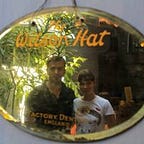Why we launched a Media Accelerator in Ukraine
A few months ago the MDF team, which works on supporting independent media, sat down to debate an urgent and important question: what happens when donor money for media projects runs out?
Much of the media world is griping with the same problem. As traditional business models collapsed in the 2000s — draining the industry of cash and talent, especially on the non-journalist side— many media firms have had to reinvent themselves as non-profits, relying on donor funding to get by. While a helpful stopgap, the current situation is not sustainable.
There have been some successes — NYT’s subscription model is paying off, as is Buzzfeed’s use of native advertising. Other models, including membership clubs, crowdfunding and leveraging social media’s scale of distribution have shown promising, albeit still very early results. But while a handful of global players is making progress, media in smaller markets have struggled.
So we flipped the equation. Rather than thinking of existing media as cases for transformation, we decided to look at regional media through the prism of entrepreneurship — if these were startups, how would you set them up for success?
The program
There is no need to reinvent the wheel. The explosive growth of the entrepreneurial ecosystem around the world has provided a number of cases studies to learn from.
After speaking to experts and a bit of tailoring for regional media, we developed a program that combines elements of an Executive MBA with a classical accelerator program. Participants attend modules to inspire, share experiences and plug knowledge gaps. In between modules they work with mentors to develop business plans and pilot their ideas.
The program, which we have called “Regional Champions”, culminates with a pitch session for investors (both donors and private funds) to pick their preferred projects. After that, we work with top candidates to develop an in-depth growth strategy to implement and scale their ideas.
Importantly, journalists have largely been left alone to solve problems outside of their expertise — the shift to non-profit status means most non-editorial functions have been stripped out (e.g., marketing, HR, finance). As result, we decided trainers and mentors should come from a wide range of backgrounds — not just media experts (those too), but also consultants, accountants, HR specialists, event managers, academics…
Only by providing this diversity can we expect our participants to address the complex challenges they are facing AND come up with the creative solutions needed to develop new revenue models.
Why Ukraine
Okay, you may say, “an accelerator sounds all well and good, but why Ukraine?” After all, the country isn’t known for press freedom or economic stability.
First there’s the country’s fast-growing IT sector, with BPO and tech firms opening offices across the country. There is a fertile ground for cross-polination of ideas and finding talent. Moreover, there is a young, affluent new audience segment hungry for better quality media products and — having seen subscription models on a range of apps they use — ready to pay for them.
Next, Ukrainian media is currently undergoing a golden era of sorts. Long stiffled by government or oligarchic pressure, the last four years have seen an explosion in the number of media of projects. Many young and entreprising journalists are ready to rethink the way media works and eager to let their creative impulses flow — all they need is some support in this direction.
Finally, the presence of significant donor support can (and should) be used to smooth the transition toward sustainable commercial models. The time is now — in a few years the crutch will disappear and oligarchs will step into the vacuum. After all, nothing motivates journalists like a deadline.
The participants
Finally, a word on the participants. We were able to pick some of the best teams out there — receiving close to 100 applications from CEOs and chief editors, including business projects, motivation essays et al. After some tough interviews we selected 10 teams representing the whole, diverse country.
These include: Tvoe Misto (Lviv), Hromadske TV (Cherkassy), Nakipelo (Kharkiv), 6262.com.ua (Sloviansk), Vgoru (Kherson), Tviy Media Bro(Lviv), Kurs (Ivano-Frankivsk), Vchasno (Pokrovsk), Tribuna (Poltava) and Inform.zp.ua (Zaporizhia).
Getting such a diverse set of participants, with experience of different media formats, locations, projects, means they also have valuable experience to share between themselves. The weekend’s discussions included lots of exchanges of experience — as well as some healthy rivalry to set ambitious targets for each other.
Future Regional Champions indeed — more coming soon…
N.B. Big thanks for the support of the National Endowment for Democracy for making this possible!!
